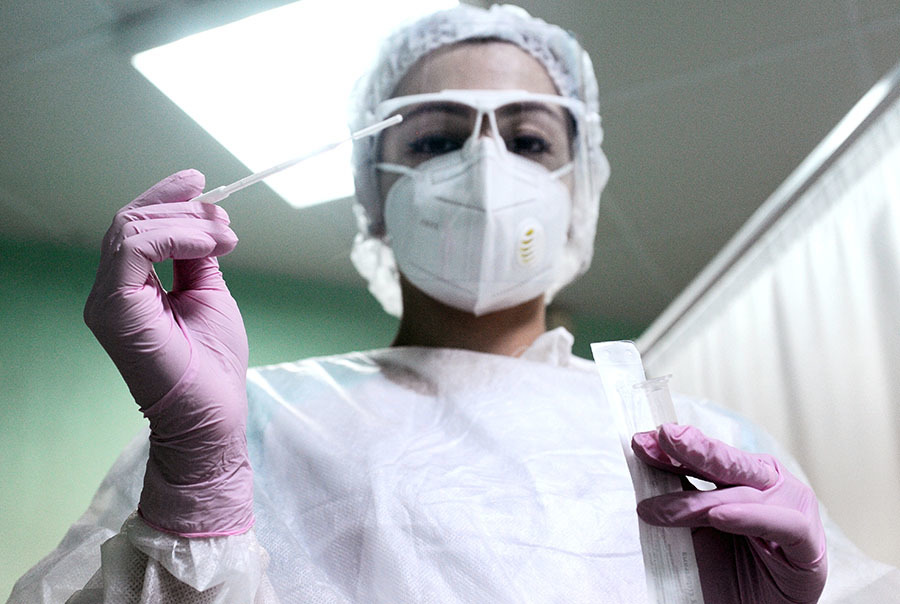Over the past day, 28,552 new cases of coronavirus infection were detected in Russia (in the two days preceding this, the figure was 28,214 and 26,509).
The total number of recorded episodes of COVID-19 in the country since the beginning of the epidemic has reached 2 791 220, almost 513 thousand of them remain active (18.37%).
Most of the new cases of coronavirus were detected in Moscow (6937), St. Petersburg (3757), Moscow (1485), Nizhny Novgorod (503), Sverdlovsk (402), Arkhangelsk (393), Rostov (389), Voronezh (388) , Pskov (375) and Vologda (367) regions, as well as the Republics of Crimea (356) and Karelia (351).
For the entire time, 2,228,633 patients have recovered in the country (26,093 - over the past day).
49,762 people died from complications that developed against the background of coronavirus infection and concomitant diseases (611 - per day).
According to Rospotrebnadzor, more than 84.9 million tests for COVID-19 have been carried out in the country, about 599 thousand people remain under medical supervision.
RIA News
© Alexey Sukhorukov
Also, Rospotrebnadzor assessed the epidemiological situation in the countries with which the Russian Federation resumed air traffic.
In total there are 16 such states: Belarus, Great Britain, Egypt, Kazakhstan, Kyrgyzstan, Cuba, Maldives, UAE, Seychelles, Serbia, Tanzania, Turkey, Switzerland, Ethiopia, South Korea and Japan.
The agency estimates the incidence rate of COVID-19 over the past two weeks (it should not exceed 40 cases per 100 thousand population), the average daily growth rate (should not exceed 1%) and the spread of infection (should be less than 1).
“The epidemiological situation meets all criteria (as of December 13) only in the Seychelles, Tanzania and Ethiopia, according to two of the three criteria - in Kyrgyzstan, Egypt, Cuba and the Maldives, one of the three - in the UK, UAE, Republic of Korea, Serbia, Japan, "Rospotrebnadzor explained.
Thus, the epidemiological situation in Belarus, Turkey and Switzerland does not meet the RPN criteria.
In this regard, the department recalled that now in most countries there is a complicated situation with COVID-19, and the risk of illness when traveling abroad is increasing.
Vaccine
Against the background of the campaign to vaccinate the population against coronavirus launched in Russia, the director of the Gamaleya National Research Center for Epidemiology and Microbiology, Alexander Gintsburg, spoke about the duration of the immunity to COVID-19 during the so-called "light vaccine" vaccination - this method assumes only one injection of the drug.
“It will be possible to expect the formation of immunity in three weeks.
We just shorten the immunity, do not make it lasting and do not create memory cells ... That is, the immunity will be short-lived, I think, for three months, at most four - according to the principle of a flu vaccine, it works for four months by force, ”TASS quotes him.
President Vladimir Putin first announced the possibility of creating a "light vaccine" in Russia yesterday, answering journalists' questions after the end of a large press conference.
The head of state stressed that the duration of the action of this drug will be shorter, but it will be possible to vaccinate many more people.
“This will be one component (vaccine. -
RT
), and will primarily be used in those countries where there is a very high mortality rate, where it is necessary to very quickly bring down this peak of mortality due to a shorter-acting vaccine preparation.
That is some kind of compromise.
It can not only be supplied to other countries, but also be produced according to our technologies in other countries, ”explained Gunzburg.
Recall that Russia was the first in the world to register the Sputnik V coronavirus vaccine, developed by specialists from the Gamaleya Center.
The drug consists of two components to develop a reliable immune response, so vaccination is carried out twice (again after 21 days).
According to the latest published data from a study of the vaccine, its effectiveness at the final checkpoint after 21 days from the moment the volunteers received the first component is estimated at 91.4%.
At the same time, the effectiveness of the drug against severe cases of the disease reaches 100%.
Commenting on these data, Denis Logunov, deputy director of the Gamaleya Center for Scientific Work, said that the peak of the immune response falls on the 42nd day after the first injection, so the assessment of the effectiveness of Sputnik V may later be revised upward.

